- Home
- Dornford Yates
Berry Scene Page 6
Berry Scene Read online
Page 6
“Very good, Madam.”
“Falcon,” said Berry, “is Mr Ightham here?”
“Yes, sir. He drove her over.”
“Where is he now? With Peters?”
“Yes, sir.”
“All right. I’ll go and see him.”
“Shall I tell him, sir?”
“If you please.”
Falcon bowed and withdrew. Berry raised his eyebrows.
“May as well get the low-down, what ever it is.”
Ten minutes later Ightham declared the truth.
“No wonder you’re beaten, sir; it’s a curious case. Our land marches with Bluecoat, as well you know. A hundred years ago, the Ferrers o’ that day wanted to buy the acres we call the Dale. My great-grandfather, George – he wouldn’t sell. ‘But I’ll tell you what, sir,’ he says, ‘I’ll give you a lease.’ An’ that’s what he did. A ninety-nine years’ lease. Well, that was near enough freehold… An’ if you ask me the truth, I think the Ferrers forgot. An’ then, two years ago, just after his lordship buys it, the lease falls in. Now if it had been Mr Ferrers, he should have had the Dale. Ninety-nine years is a lifetime – an’ more than that. I’d have let ’is lordship have it, if only he’d spoken me fair. But he couldn’t do that. We’re only farmer stock, and he’s a lord. But he’s a stranger, sir, and we’ve been here for a hundred and fifty years. An’ he talked to me as if I was one of his gardeners… ‘I’m buying those meadows,’ he says. ‘I don’t want another lease. I’m telling my lawyers so, and you’ll hear from them.’ Well, that’s not neighbourly, sir. An’ when his lawyers wrote, I said they was not for sale. An’ then he writes to me, an’ talks about ‘impertinent conduct’. So I put the Boy Scouts there… An’ now he shuts Romany Lane… He don’t know behaviour, sir, and that’s the truth.”
“What on earth’s he playing at – shutting the lane? I mean, he must know he can’t do it.”
“That he can’t,” said Ightham, “and so he’ll find. To my knowledge that lane’s been open for forty-five years. And there’s others older than me.”
“Then why’s he done it?” said Berry. “He must know the law.”
“It’s a try-on, sir. He’s having a very big house-party next weekend. Some foreign royalties is coming – a German prince an’ princess. That’s what Jack Belcher told me – he’s acting as bailiff now. Jack told him he couldn’t do it: but his lordship shouts him down. Says his guests’ privacy’s got to be respected, he says. ‘You carry out your orders,’ he shouts.”
“A temporary measure?” said I.
Ightham shrugged his shoulders.
“The gate’s there, sir. I’ve seen it. An’ now it’s there, I can’t see him taking it down.” He laughed abruptly. “A stranger shouldn’t do that.”
“What d’you know, Mr Ightham?”
The farmer looked round.
Then—
“I’m told, sir, Old Chalk’ll open it Wednesday next.”
We called at Bluecoat the next day, precisely at ten o’clock.
“His lordship in?” said Berry.
“He is, sir.”
“Ask him if he’ll give me ten minutes.”
“Certainly, sir. Will you please to come this way?”
We entered a chamber which I had known as a child.
One minute later the peer strode into the room.
“Morning, Withyham,” said Berry. “Forgive us for calling so early, but, if we hadn’t come now, we couldn’t have come today.”
“Is it so urgent, Pleydell?”
“Yes,” said Berry, “it is. The thing is this. I know your respect for tradition. Of that respect you chose Bluecoat, and of that respect you maintain it, as Bluecoat should be maintained. For that reason, I venture to ask you to reopen Romany Lane. I know—”
“If I’d had—”
“Bear with me for a moment.” Lord Withyham bit his lip. “I know it’s a temporary measure, but—”
“And there you’re wrong,” said Withyham. “Romany Lane is mine.”
“Of course it’s yours,” said Berry. “But everybody has used it for many years.”
“And now they think it’s theirs.”
“They don’t, indeed,” said Berry. “And there is no reason at all why you shouldn’t put up a gate. But you’ve put a chain on the gate – and that is what upsets them. You see, they feel—”
“They think they’ve a right of way. Is that what you’re trying to say?
“They do,” said Berry. “And country people are jealous of rights of way.”
“Well, I don’t think – I know. Prescription doesn’t apply in a case like this.”
“I don’t agree,” said Berry, “but that’s beside the point. You don’t want to cross your neighbours – I’m sure of that. Yet, you want to close Romany Lane for the next weekend. Now, if you put a card on the gate—”
“Very clever,” sneered Withyham. “A card requesting their indulgence. And then, when it comes to Court, that card’s produced against me.”
Berry frowned.
“I hope,” he said quietly, “I hope it won’t come to Court.”
“I know. You’re trying to bluff me. You and that snivelling priest—”
“Really, Withyham, you must not talk like that. John Chisholm’s a better man than you or I. And—”
“What are you here for, Pleydell? To tell me how to behave?”
Berry raised his eyebrows.
“I wish you’d see reason,” he said. “Today the public is ready to perceive the mote of oppression in every great man’s eye. And you are offering them a beam. You really are. Giving them something to get hold of. And that’s – unfortunate, Withyham. Class hatred’s a dreadful thing. It’s been deliberately fostered for some years now – by certain politicians, to gain their ends. But it’s never touched our parish – we’ve always been happy here. And there’s no reason why it should: for there’s nothing for it to breed on. But if you shut Romany Lane—”
“I asked what you were here for.”
“We are here,” said Berry quietly, “to ask you to open that gate. I’m told you don’t want the lane used during the next weekend. If you will take off that chain, I will guarantee that nobody uses that lane on Saturday, Sunday and Monday next.”
“You will, will you? And what about after that?”
“Your guests will be gone, Withyham.”
“I shan’t be gone, Pleydell.”
“Look here,” said Berry. “We both of us know the law. If a private road is not closed for twenty-one years, the right to close it is lost and all His Majesty’s subjects may use it whenever they please. In this case, before you bought Bluecoat, the right to close Romany Lane was lost for good. That right, you cannot revive. And if you seek to revive it, by closing the lane, the parish won’t stand it, Withyham – and that’s the truth.”
“What you mean is you won’t stand it?”
“No, I don’t,” said Berry. “But sides will have to be taken, and we shall take that of the parish, because you are doing something which you have no right to do.”
“We’ll see about that,” said Withyham. “You’d better get out your hat. It costs quite a lot to go to the House of Lords.”
Berry looked out of the window and fingered his chin.
“Bad show, Withyham,” he said.
“What the devil d’you mean?”
“What I say. You know you’ve no case: but you know you’ve got the money – which we have not. And you’re counting upon your money to weight us out of the race.”
At the third attempt—
“Have you anything more to say?”
“Any amount,” said Berry. “But we’ve got to be getting on.” I turned, to open the door. “Funny thing, you know. The last time I was in this chamber, Jim Ferrers was speaking of you. ‘He should be all right,’ he said. Well, there we are. Don’t bother to see us out.”
As the car slid down the drive—
“Was it too awful?”
said Daphne.
“Well, it wasn’t very pleasant,” said Berry. “The impulse to offer him violence was very strong.”
“My darling,” said I, “I give your husband best. His manner was as fair as Withyham’s was foul.”
“Let me put it like this,” said Berry. “The man is a vulgar sweep. When he spoke of the vicar, he called him ‘that snivelling priest’.”
“He didn’t!” – incredulously.
“He did, indeed. He gave offence every time he opened his mouth. I don’t wonder he mucks in with Germans – they’d just about suit his book. Indeed, I can hardly believe that he is his father’s son.”
“What’s the matter with him?” said Daphne.
“God knows. He’s just aggressive. Can’t live and let live. Basil, Baron Withyham, would be improved by death.”
“Can’t he see that he’s cutting his throat by taking this line?”
“I don’t know that he is. Very few people have him more than once. And now let’s dismiss the matter.”
“In a moment,” said I. “Daphne’s a right to hear your Parthian shaft.”
“Ah,” said Berry. “I think I got back there.”
When I told Daphne, she put her hands to her mouth.
“He’ll never forgive you,” she said.
“I can think of few things more gorge-raising,” said Berry, “than to be forgiven by Withyham.” He lifted his voice. “Stop at the next pub, Jonah. I want to clean my teeth.”
Lunch was nearly over, and fruit was being served, when the butler brought in a parrot and set him upon the table by Geoffrey Majoribanks’ side.
“Let me present,” said Geoffrey, “The Evil One. He always comes into dessert, and he likes it very much when strangers are here.”
Daphne looked at her hostess.
“Why the misnomer?” she said.
“Because of his eye,” said Diana. “He’s really as good as gold, but he looks a rogue.”
The Evil One surveyed the company.
“There you are,” said Berry. “He’s seeking whom he may devour.”
The Evil One looked at the speaker. Then, with deliberate steps, he rounded a dish of plums and, avoiding a silver cream-jug, made for where Berry sat.
Diana Majoribanks began to shake with laughter.
“He’s quite all right,” said Geoffrey.
“Oh, I’m sure of that,” said Berry. “Beautiful beak he’s got, hasn’t he? Well, Lucifer, what d’you know?”
The parrot regarded him straitly.
Then—
“Damn your eyes,” it said.
As soon as Berry could speak—
“You wicked bird,” he said. “And on a Monday, too. You – you ought to be ashamed of yourself.”
The Evil One laughed heartily.
“Of course, you’re abandoned,” said Berry. “Old in sin. How’s Proserpine?”
The Evil One appeared to digest this.
Then—
“You’re a one,” it observed.
Berry swallowed.
“The trouble with you,” he said, “is that you don’t know your catechism. What about ordering yourself lowly and reverently to all your betters?”
“Shut your face,” said the parrot shortly.
Berry moistened his lips.
“I’m not surprised,” he said, “at the name you bear. Here am I, only too ready to converse—”
“Give paw,” said The Evil One.
Berry looked at Diana.
“He means it,” she said, wiping the tears from her eyes. “He’s taken a fancy to you. Put your hand on the table.”
Berry laid his hand on the table, beside his plate.
Carefully The Evil One inspected it. Then he stepped on to Berry’s palm and began to move up his arm.
We watched his progress breathlessly.
When he had reached Berry’s shoulder, he whispered in Berry’s ear.
“No, not really?” said Berry. “Did you see them?”
He laughed – and the parrot with him, as though enjoying some scandal, unfit for our ears.
Before this absurd communion, we all broke down.
As soon as she could speak—
“I can’t bear to interrupt you,” said Diana, “but there’s a wasp on your collar – going up.”
“Well, get it off, someone,” said Berry. “I – I’m deeply engaged. My movement might be misconstrued. Besides, I don’t know where it is.”
“Quite still,” said Jonah, rising. “It’s passing on to your neck.”
“Oh, hell,” said Berry. “I can feel it.”
“No, you don’t,” said the parrot.
“What d’you mean,” said Berry, “–‘No, you don’t’? A BF – that’s what you are. Why don’t you do it in?”
Bent double with laughter, Jonah was unable to help, and the wasp crawled doggedly forward, towards Berry’s ear,
“My God,” said Berry, “for the milk of human kindness, will nobody intervene?”
By a superhuman effort, my cousin straightened his back; but, as he approached his finger, to flick the insect away, the parrot read into his gesture a coming assault. With hackles raised, The Evil One rose in his wrath and aimed such a blow at his hand that, had it ‘connected’, would have cut the flesh to the bone.
“It’s all right, old fellow,” said Jonah, “I’m—”
“It isn’t all right,” raged Berry. “Why the devil don’t you—”
“He can’t,” shrieked Daphne. “The parrot—”
“Damn the parrot,” roared Berry. “I’m talking about the wasp.”
“But the parrot won’t let him.”
“Won’t let who?” yelled Berry.
“He’s a drunken swab,” said The Evil One.
“So he is,” said Berry, unconsciously turning his head. The movement was fatal – he was immediately stung.
With a squeal of pain, he started up to his feet: but for this, the parrot was unready, and, to save itself, it laid hold of Berry’s collar with all its might.
“A-a-ah, there’s another,” roared Berry. “I feel the swine. I tell you, I’m swarming with them. Why the devil doesn’t somebody—”
“It’s qui-quite all right,” wailed Diana. “It’s only—”
“All right?” screeched Berry. “There’s one down my neck – I can feel it. Am I to stand here and be murdered before your eyes?”
With that, he inserted his finger beneath the parrot’s beak…
Could we have helped, we would have: but we were so weak with laughter that we could not stand up; and when Berry, feeling the beak, believed it to be a stag-beetle, and, presenting his neck to Diana, implored her to pick it off, the vials of mirth were poured out.
And then the inevitable happened.
Sick of Berry’s efforts to take from him what hold he had, The Evil One lodged the only protest he knew…
Staunching the wound with his napkin, Berry resumed his seat.
Gravely he looked round the table.
“Oh, very funny,” he said. “Very funny, indeed. Couldn’t tell me, could you? Couldn’t indicate that I was unwittingly provoking a dangerous swine?” Then he spoke over his shoulder. “Sorry, old fellow. I didn’t know it was you.”
Thus reassured, the parrot released its hold and retraced its steps. Once more upon the table, it looked Berry up and down.
“You’re a one,” it declared.
Berry sat back.
“Let me say at once,” he said, “that I suspect your use of that innocent substantive. I am by no means sure that, if you were capable of defining it, I should be satisfied with your definition. And now, if you’ll forgive me, I must receive medical attention. This gash apart, thanks to your indifference, the poison recently injected into my nape is causing me considerable pain.”
The parrot was convulsed with laughter.
Nearly three hours had gone by.
Berry had slept off his malaise on the famous Hammercloth lawns, Dia
na and Geoffrey Majoribanks had proved the car, and we were on our way home, when one of our tires gave out by the village of Shepherd’s Pipe.
As Fitch began to take off his coat—
“That’s the worst of them things,” said a voice.
We looked up to see a fat man on the farther side of a gate. His arms were resting on this and he had a straw in his mouth. Though he looked the picture of health, he was wearing a mournful air; and he made me think of a jester, short of a job. His overalls suggested that he had to do with machines.
“I admit it’s a fault,” said Daphne. “But I think it’s the only one.”
The other nodded.
“They get you about, don’t they? My brother-in-law’s a chauffeur. ’E took me out one day. Course ’is bloke didn’t know, but we ’ad a lovely ride.”
“Where did you go?” said Daphne.
“Round about ’Ind’ead, lady. Course I know all the roads – I told ’im the way to go. But it’s funny the way the country seems to slip by. I quite enjoyed it, I did.”
“You travel the roads?” said my sister.
“That’s right, lady. Born in a circus, I was. But that’s no life. I’ve ’ad me own merry-go-round for twenty years.”
“And you go from fair to fair?”
“An’ private jobs. You soon get used to the noise.”
“Oh, yours has an organ, has it?”
“I’ll say it ’as,” said the man. “You can ’ear it two miles off. That’s what I meant about the noise. ‘Oby’s Steam Round-Abouts – once ’eard, never forgot. It’s a paraffin-engine reely – works a treat.” He jerked his thumb over his shoulder. “I got it ’ere – in this field. But it’s not set up. I’m wot they call ‘restin’’, lady. Nobody loves me now. But I open at Brooch again on Saturday week.”
“It’s like that, is it?” said Daphne. “Up and down.”
“That’s right,” said Mr Hoby. “More up than down, you know. I can’t complain. But I ’aven’t the private practice I ’ad two years ago. Still, I got a lot o’ good frien’s. ’Ere I am in this meadow – four ’orses grazin’ their ’eads off, an’ nothin’ to pay. They draws the stuff on the road.”
“All over England?” said Daphne.
“South and West, lady. I never did fancy the North. You can ’ave the Yorkshire dales.”
“May I interrupt?” said Berry.

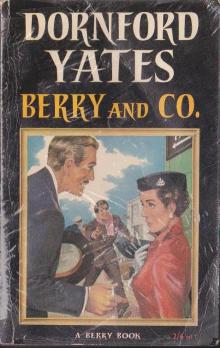 Berry and Co.
Berry and Co. Jonah and Co.
Jonah and Co. The Funny Bone: Short Stories and Amusing Anecdotes for a Dull Hour
The Funny Bone: Short Stories and Amusing Anecdotes for a Dull Hour The Brother of Daphne
The Brother of Daphne Courts of Idleness
Courts of Idleness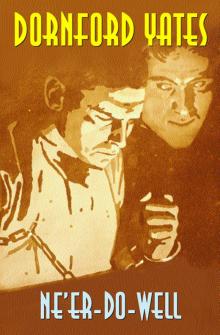 Ne'er Do Well
Ne'er Do Well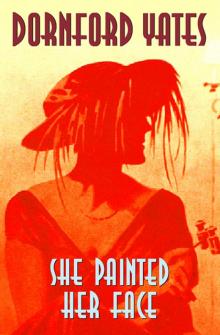 She Painted Her Face
She Painted Her Face Safe Custody and Laughing Bacchante
Safe Custody and Laughing Bacchante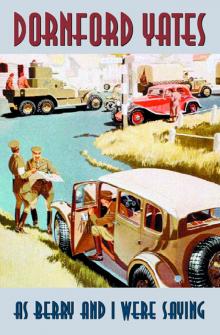 As Berry and I Were Saying
As Berry and I Were Saying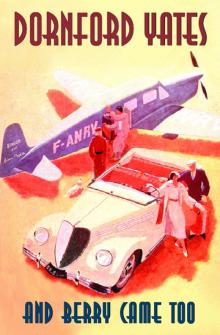 And Berry Came Too
And Berry Came Too Valerie French (1923)
Valerie French (1923)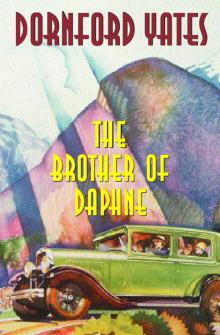 Brother of Daphne
Brother of Daphne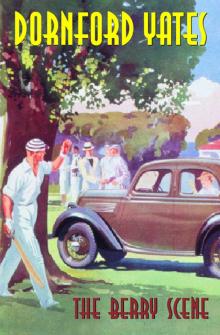 Berry Scene
Berry Scene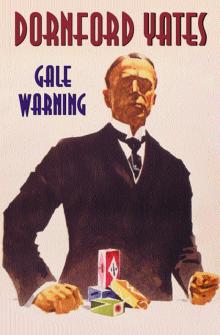 Gale Warning
Gale Warning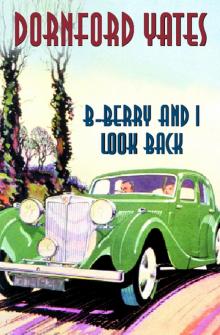 B-Berry and I Look Back
B-Berry and I Look Back Storm Music (1934)
Storm Music (1934)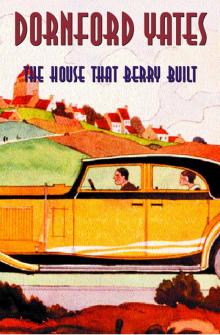 House That Berry Built
House That Berry Built